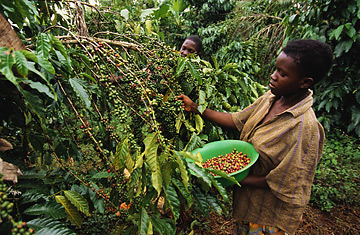
A Ugandan harvests coffee beans.
Looking for Starbucks coffee in the rural Ugandan town of Mbale? You'll find it up a winding, red-dirt road on the vast slopes of Mount Elgon. It's not in paper cups; in fact, it's not yet brewed or even roasted. But hundreds of farmers in this patch of East African countryside are now growing premium coffee beans, having sold their first crop to the U.S.-based chain earlier this year. And, although the Uganda Coffee Development Authority estimates that less than 1% of the price paid for a cup of African coffee in the West actually reaches the local farmer, the effect has nonetheless been profound. Says farmer John Wolimbwa, "It's been a big difference in income due to this sale."
East African growers are experiencing a surge of demand from Western coffee connoisseurs for beans grown in unique areas. European companies such as DruCafe are buying up east African coffee harvests, while Starbucks — which already features specialty coffees from Rwanda, Kenya and Ethiopia, and also buys green coffee beans from Tanzania and now Uganda — announced in February that it plans to double its imports from Africa by 2009.
"People are looking for something different, and East African coffee is very exotic in terms of its flavors and characteristics," says Philip Gitao, director of the Eastern African Fine Coffees Association. The fine Arabica varieties found in East African highlands currently provide 18% of the world's coffee, the largest share from Ethiopia, which claims to be the birthplace of coffee although Yemen disputes that claim. Says Gitao, "Starbucks is now taking African coffees very seriously."
Uganda's producers are all too happy to oblige the new demand. Andrew Rugasira, Ugandan founder of the fair-trade Good African Coffee, in 2005 won the first ever contract for an African producer to sell processed coffee directly to a British supermarket, the high-end Waitrose chain. Rugasira's deal with Waitrose enables him to pay double the market price for the beans of 14,000 farmers in the hills of the Rwenzori Mountains. He plans to launch his tea and coffee brands in the U.S. next year.
"Consumers for premium products — organic, ethical and fair-trade —are increasing," Rugasira says. Many East African farms growing coffee, flowers and vegetables are organic by default, since chemical fertilizers and pesticides are either unavailable or too expensive. But their organic advantage may be undercut, in the minds of environmentally conscious Western consumers, by the "carbon miles" (jet fuel released into the atmosphere) required to bring their coffee to stores in Europe and the U.S.
Still, producers are confident that the high quality of their beans improves their bargaining power. "The better the coffee, the prices," Gitao says, though he admits that despite a trickle-down effect, farmers still don't make a large profit. The farmers on Mount Elgon have no idea of why coffee is so expensive in the West. But they can feel the benefit: "The increased prices have encouraged me to improve quality — I can pay school fees, buy fertilizer and get a bit more money to buy better equipment," says Yakobo Nabigumba, who lives on the mountain and sells his beans to the Kyagalnyi Group, a Ugandan private coffee exporter. After Kyagalnyi sold beans to Starbucks this year, it says it was able to pay farmers not only an improved price for the high grade coffee, but also a bonus. Pressure on companies to maintain transparent, ethical policies toward their workers has also benefited farmers. David Barry, managing director of Kyagalnyi, says, "Starbucks helps us get a phenomenal price, but we have to show them that we're paying farmers a higher price."
Local farmers are not just banking on quality and corporate ethics. During fairs such as the "Taste of Harvest," held in all 11 east African countries each year, growers and companies are brought together for blind tasting contests. These competitions offer Western coffeehouses a direct connection to the source of their beans at the same time as allowing farmers to showcase their crops.
Now that coffee is helping to float East Africa's economies, producers are hoping to import the urban coffee-drinking culture of the West into the region. Except for Ethiopia, which actually consumes half of the coffee it grows, other East African are wedded to tea. Many Ugandan farmers have never bothered to taste their own coffee — more important, for them, is to have Western consumers drink it. Says Gitao, "The world has discovered us; it's about time we ride this wave."
